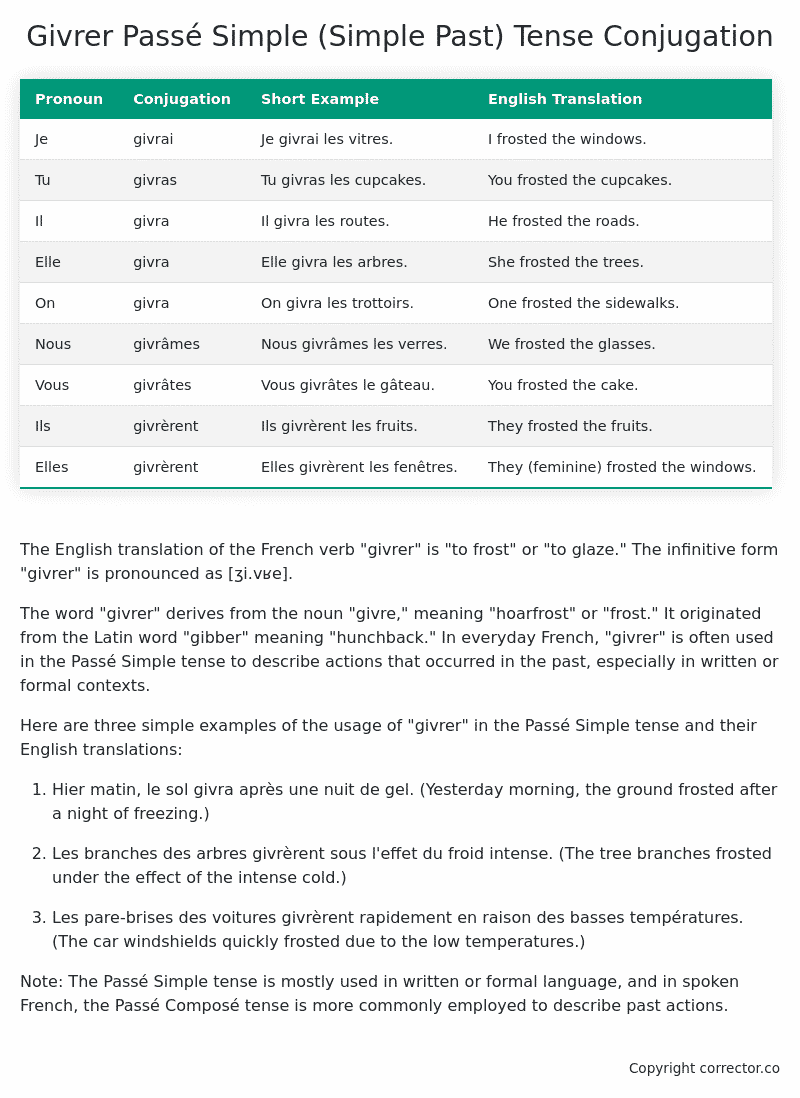Passé Simple (Simple Past) Tense Conjugation of the French Verb givrer
Introduction to the verb givrer
The English translation of the French verb “givrer” is “to frost” or “to glaze.” The infinitive form “givrer” is pronounced as [ʒi.vʁe].
The word “givrer” derives from the noun “givre,” meaning “hoarfrost” or “frost.” It originated from the Latin word “gibber” meaning “hunchback.” In everyday French, “givrer” is often used in the Passé Simple tense to describe actions that occurred in the past, especially in written or formal contexts.
Here are three simple examples of the usage of “givrer” in the Passé Simple tense and their English translations:
-
Hier matin, le sol givra après une nuit de gel.
(Yesterday morning, the ground frosted after a night of freezing.) -
Les branches des arbres givrèrent sous l’effet du froid intense.
(The tree branches frosted under the effect of the intense cold.) -
Les pare-brises des voitures givrèrent rapidement en raison des basses températures.
(The car windshields quickly frosted due to the low temperatures.)
Note: The Passé Simple tense is mostly used in written or formal language, and in spoken French, the Passé Composé tense is more commonly employed to describe past actions.
Table of the Passé Simple (Simple Past) Tense Conjugation of givrer
| Pronoun | Conjugation | Short Example | English Translation |
|---|---|---|---|
| Je | givrai | Je givrai les vitres. | I frosted the windows. |
| Tu | givras | Tu givras les cupcakes. | You frosted the cupcakes. |
| Il | givra | Il givra les routes. | He frosted the roads. |
| Elle | givra | Elle givra les arbres. | She frosted the trees. |
| On | givra | On givra les trottoirs. | One frosted the sidewalks. |
| Nous | givrâmes | Nous givrâmes les verres. | We frosted the glasses. |
| Vous | givrâtes | Vous givrâtes le gâteau. | You frosted the cake. |
| Ils | givrèrent | Ils givrèrent les fruits. | They frosted the fruits. |
| Elles | givrèrent | Elles givrèrent les fenêtres. | They (feminine) frosted the windows. |
Other Conjugations for Givrer.
Le Present (Present Tense) Conjugation of the French Verb givrer
Imparfait (Imperfect) Tense Conjugation of the French Verb givrer
Passé Simple (Simple Past) Tense Conjugation of the French Verb givrer (You’re reading it right now!)
Passé Composé (Present Perfect) Tense Conjugation of the French Verb givrer
Futur Simple (Simple Future) Tense Conjugation of the French Verb givrer
Futur Proche (Near Future) Tense Conjugation of the French Verb givrer
Plus-que-parfait (Pluperfect) Tense Conjugation of the French Verb givrer
Passé Antérieur (Past Anterior) Tense Conjugation of the French Verb givrer
Futur Antérieur (Future Anterior) Tense Conjugation of the French Verb givrer
Subjonctif Présent (Subjunctive Present) Tense Conjugation of the French Verb givrer
Subjonctif Passé (Subjunctive Past) Tense Conjugation of the French Verb givrer
Subjonctif Imparfait (Subjunctive Imperfect) Tense Conjugation of the French Verb givrer
Subjonctif Plus-que-parfait (Subjunctive Pluperfect) Tense Conjugation of the French Verb givrer
Conditionnel Présent (Conditional Present) Tense Conjugation of the French Verb givrer
Conditionnel Passé (Conditional Past) Tense Conjugation of the French Verb givrer
Conditionnel Passé II (Conditional Past II) Tense Conjugation of the French Verb givrer
L’impératif Présent (Imperative Present) Tense Conjugation of the French Verb givrer
L’impératif Passé (Imperative Past) Tense Conjugation of the French Verb givrer
L’infinitif Présent (Infinitive Present) Tense Conjugation of the French Verb givrer
L’infinitif Passé (Infinitive Past) Tense Conjugation of the French Verb givrer
Le Participe Présent (Present Participle) Tense Conjugation of the French Verb givrer
Le Participe Passé (Past Participle) Tense Conjugation of the French Verb givrer
Struggling with French verbs or the language in general? Why not use our free French Grammar Checker – no registration required!
Get a FREE Download Study Sheet of this Conjugation 🔥
Simply right click the image below, click “save image” and get your free reference for the givrer Passé Simple tense conjugation!

Givrer – About the French Passé Simple (Simple Past) Tense
Formation
Usage
Narration
Historical Context
Interactions with other tenses
Passé Composé
Imparfait
Conditional and Subjunctive
Summary
I hope you enjoyed this article on the verb givrer. Still in a learning mood? Check out another TOTALLY random French verb conjugation!


